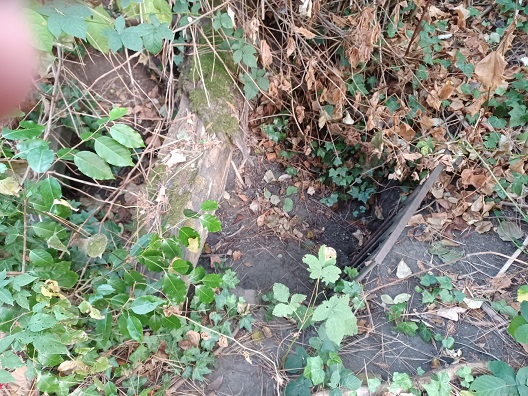A Dry Stream in Washington State
October 9, 2022
by William P. Meyers
Popular pages:
| U.S. War Against Asia |
| Fascism |
| Democratic Party |
| Republican Party |
| Natural Liberation |
Another Sign of the Slow Motion Apocalypse
The stream that is supposed to run beside my house is dry. Western Washington is in the first stage of drought after its driest summer on record. This is Seattle folks, famous for its rain. Local residents often exaggerate slightly, speaking, for instance of the Seattle Rain Festival, which runs from November until October. However, in fact the real rain is on the coast of Washington State. Between Seattle and the Pacific Ocean we have the high mountains of the Olympic Peninsula. So our rain, while frequent, comes in lower doses. Our driest months are typically June through September, when precipitation averages less than 2 inches per month. See also Seattle climate details.

Admittedly my stream, Little Brook Creek, is a small stream. It runs into Thornton Creek which in turn runs Lake Washington. In lots of places it has been confined to pipes so buildings could be built over it, or it looks like it is just part of a ditch system. But once it was a salmon creek. Back, say, in 1800, when the world's population was 1 billion, the Industrial Revolution had just begun, and the Slow Motion Apocalypse was at best in an embryonic stage. Little Brook Creek is not entirely dry, yet. A slow flow of water starts emerging from mud before plunging into a pipe under 30th Ave. NE, then gradually picks up dribs and drabs of water as it moves south. The best place to look at it if you are a tourist is at the back of Little Brook Park.
As Apocalyptic signs go, its dry stream bed does not seem like much. Not like this year's heat wave in India, the cataclysmic floods in Pakistan, the famine in Ethiopia, or the much-covered hot spell and low water streams in Europe. No major media would bother to notice it, much less report it, though the closing of fishing in many streams in Olympic National Park, which happened last week, was reported in the local news outlets. It can't compete with Hurricane Ian striking Florida. But it is worth some consideration, even if more than half of the United States is in some level of drought [See Drought Monitor].
Humans are a very clever species. We have developed a lot of capital in the form of buildings, roads, factories, and knowledge. Most of that development has been since 1800. We have also started a boulder tumbling downhill, capable of smashing everything we have built up to date. Those of us who watch the boulder tend to focus on carbon dioxide produced from burning fossil fuels, the resulting increase in global temperatures, and the consequent storms, droughts, and famines. That is not the limit of it; many other things have been done, and continue to be done, to destroy the web of life we depend on. Even when governments are willing to act to at least mitigate some of the longer term effects of the Slow Motion Apocalypse, their populations won't let them. People don't want less, they want more. They want magic. If scientists had a magic wand to stop global warming, one that did not require having less children, or forgoing the wonders of America like electric washing machines, refrigerators, and air conditioning, that would be fine.
If the earth is a theater, there is a fire burning in it. Some people have yelled fire, but most are mesmerized by what is on the screen (or billions of little screens). There is no escape. There is no next planet to go to, there is no technology that can allow humans to survive in space for more than a brief period of time.
There is no rain in the 10 day forecast for Seattle. But it will rain eventually, and Little Brook Creek will fill up again. It will even flood. I know that from experience. The pipes that confine it when it runs under buildings are too small, and so it floods where we try to force it underground. Then, if rainfall is less than normal this winter, it will dry out early in the spring. And in ten or twenty years, the changing climate and the rain shadow of the Olympics will turn Seattle into a desert city.
But don't worry too much. If people had listened to groups like Zero Population Growth in the 1960s, we would have a population of about 3 billion people, and despite environmental degradation we could be on the path to weaning ourselves down to a sustainable population of about 1 billion globally. But since we have destroyed so much already, and know the warming that is taking place will destroy so much more, we can guess that for a while, likely later in the century, perhaps as soon as within this decade, the global human population will plunge well below the long-term sustainable level. Below one billion.
Will we, Homo sapiens, have learned anything in the process? That is beyond my ability to predict.
"But as man suffers from the same physical evils as the lower animals, he has no right to expect an immunity from the evils consequent on the struggle for existence. Had he not been subjected during primeval times to natural selection, assuredly he would never have obtained his present rank."—Charles Darwin, The Descent of Man
| Copyright 2022 William P. Meyers. All rights reserved. |
